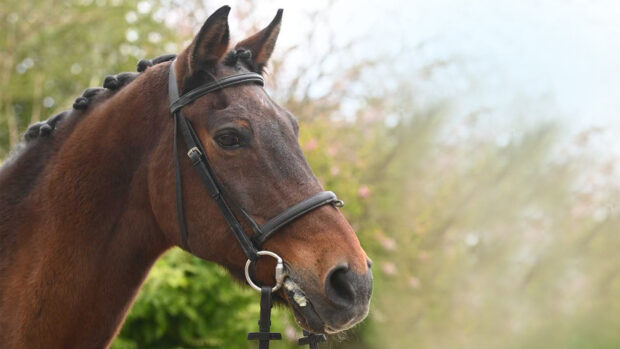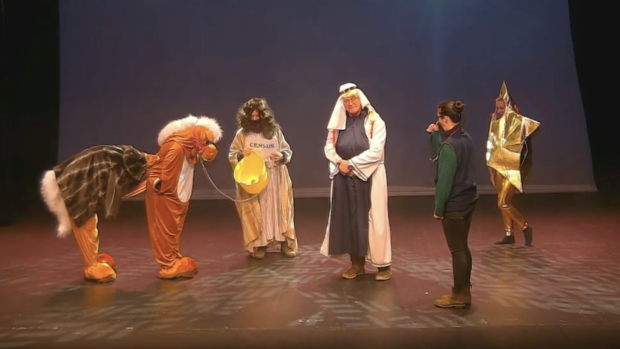The new chief executive of the Riding for the Disabled Association (RDA) believes horses’ social relevance is as key to the industry’s future as social licence.
Michael Bishop, who took on the job in April, said he is passionate about ensuring equestrianism is accessible, and about sharing the stories of how horses change human lives.
Mr Bishop told H&H a major thread he took from his previous job, director of corporate strategy and business improvement at Historic England, was the way to take a vehicle – in that case heritage – make it relevant to people and use it to improve their lives.
“The chance to connect those two things at RDA was an opportunity I couldn’t at least try throwing my hat in the ring for,” he said.
Michael, an amateur eventer, is a trustee of the British Racing School; what got him involved there was the ability of such an institution to “open up horses and equestrian sport to more people”.
“I’d seen the RDA as this incredible vehicle to tell a narrative about the connection horses have with people’s lives and how that can address some of society’s major challenges and the challenges people face,” he said.
Mr Bishop said his starting point is that the RDA is not a charity focused on equine care or welfare; these are of course very important but “first and foremost, we’re a health and wellbeing charity interested in improving the lives of disabled people in the UK”.
While finding his feet over the past four months, he said, he has been struck by the diversity of the 400 or so RDA groups, and the need to tell the stories of their work, from supporting riders and drivers with physical disabilities to, for example, the non-ridden work supporting people experiencing mental health crises.
“I really want to emphasise and share the incredible work RDA groups are doing because I think that can be undersold, or at least not well enough represented for the scale of impact,” he said. “RDA, by the number of volunteers, and participants we reach, is a major national charity, and I don’t think we’re good enough at telling that story and therefore seeking the support we critically need. I’d like us to have more data to be able to support that story and so be able to focus our resources and attention on supporting those people who are most in need of our support, and I hope that’s something data will help us achieve.”
The social relevance of horses
Another of Mr Bishop’s key focuses is one that affects the whole industry.
“Clearly the social licence conversation is of critical importance, and I don’t think anyone involved in horses can underestimate the scale of that challenge,” he said. “But I think there’s an even bigger conversation we ought to be having, about the social relevance of horses. And I really want to use the RDA stories; there are lots of others too, to demonstrate how socially relevant horses can be to all of our lives.”
He explained that many of the public may not engage in a welfare-led or social licence debate but that the industry must show those people that horses are relevant and accessible to them.
“One thing I was struck by was people who wrote to me and said, ‘Fantastic you’re doing this. Here’s a picture of a niece or nephew who’s been to six sessions with their local RDA group, and here they are with confidence; one colleague sent me a picture of her niece now doing ballet, having gained the confidence through an RDA group.
“And why is that relevant to this conversation? Because there’s a family who had no previous connection with horses, and this message was, ‘I now get why you’re interested in this horse thing; I thought this was a bit odd, but, but now it’s relevant to me’. Those people can be passionate advocates for an active use of horses in our society, and without that connection, it just wouldn’t have been something that was on their radar.”
Mr Bishop said he believes the sector, including racing, has “a common responsibility to maintain that social relevance, while we have the really important conversation about social licence”.
“If we don’t look after relevance, how do we speak to different communities? How do we encourage them to engage with horses?” he said. “How do we demonstrate that horses are relevant to their lives? There’s a worse thing than losing licence, which is just becoming irrelevant.”
Mr Bishop said that of course the need for horse welfare to be at the forefront is crucial, but without social relevance, there will not be the opportunity to attract people into the industry.
He added that owing to a broken foot, he has not had as much time at the yard lately as he would like.
“I miss the bit at the end of the day, when there’s contented munching and all the jobs are done; that’s always the moment I come back to as my ‘this is the power of horses’,” he said. “That’s when I feel most settled in my life and content.
“That feeling has stayed with me from a kid in riding schools and that might be something we all take for granted, but that connection is something that we all have a responsibility to maintain.”
- To stay up to date with all the breaking news throughout the Paralympic Games, Burghley, Horse of the Year Show and more, subscribe to the Horse & Hound website
You might also be interested in:

Anna Ross: ‘Let’s move forward with pride in our past and the humility to improve sport’

H&H Olympic reporter’s blog: a wonderful Olympics – but welfare questions will continue

Subscribe to Horse & Hound magazine today – and enjoy unlimited website access all year round





